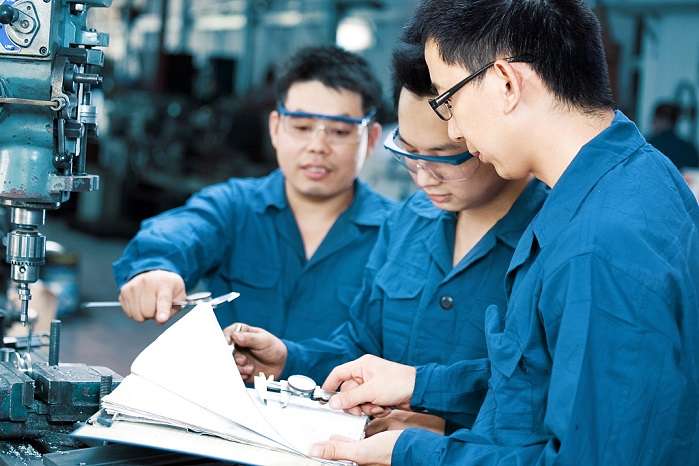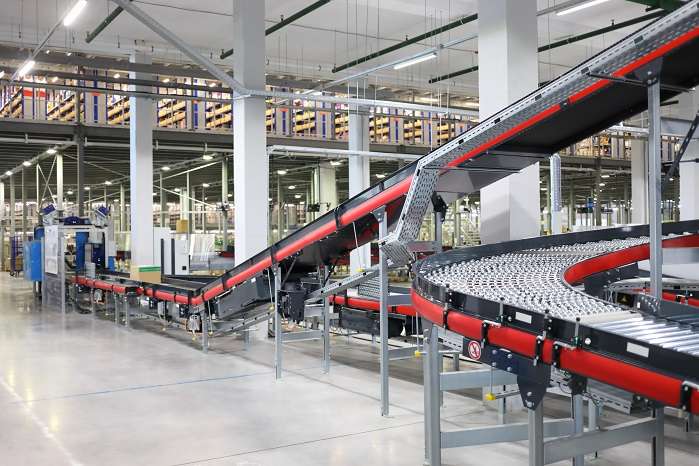Flexible manufacturing system: what is it and how does it work?

Manufacturing operations are typically complex and resource-heavy. Often, the production process runs as a whole, and minor changes or disruptions to that process can cause time and resource losses.
But in a business world increasingly moving at light speed, manufacturers cannot afford lumbering operations that are slow to react to change. Maintaining a lean and dynamic operation can provide a significant business advantage, and flexible manufacturing systems are one-way companies address this need.
Studies show that flexible manufacturing systems promote operational agility and can boost productivity by 50% or more.1 Additionally, companies with a flexible production setup can become more competitive and potentially upgrade their market position.
If you’re wondering what a flexible manufacturing system is and how it can enhance your operations, we’re here to help. This article explains what flexible manufacturing systems entail, their key features, and the pros and cons to consider.
Table of Contents
What is a Flexible Manufacturing System?
A flexible manufacturing system (FMS) is a production method focused on adaptability. It stems from the recognition that no manufacturing operation is set in stone — changes are always bound to happen, both big and small.
Consequently, an FMS works to accommodate production changes without affecting quality, budget, or production deadlines. Flexible production offers a higher degree of agility, enabling faster response to changes in product specifications, features, or an entirely new production run.
Because it’s an entire system, every aspect of an FMS is automatically calibrated to accept and incorporate manufacturing changes without slowdowns or delays. As a result, FMS depends on technology to swiftly and accurately pivot production as requirements change.
FMS is often used to power “made-to-order” production processes where clients dictate product specs and other details.

The two categories of flexibility in flexible manufacturing
As you’ve seen, the core feature of FMS is its flexibility. This flexible manufacturing process has two main aspects: machine flexibility and routing flexibility.
Machine flexibility
Machine flexibility refers to a machine’s range and ability to adapt to new product types. This aspect of FMS emphasizes the machine’s utility and is crucial in agile production processes where changes must be adapted rapidly.
Machine flexibility explains how a system can alter the sequence in which operations are carried out on a specific portion to produce a new product type.
Routing flexibility
On the other hand, the degree to which a machine can adapt to variations in the volume, capacity, and variety of output is referred to as “routing flexibility.” Routing flexibility is crucial in adapting to variations in order volume or availability of raw materials. The machine must operate efficiently given the materials at hand and any changes to the environment outside.
Routing flexibility particularly considers the system’s capacity in employing various machines to carry out the same tasks on a single item. In addition, operations continuity and production uptime are guaranteed via flexible routing.
Types of Flexible Manufacturing Systems
There are five types of flexible manufacturing systems based on functionality.
- Sequential FMS: Typically, a sequential FMS would produce one part before moving on to another. Many manufacturing processes operate in this sense.
- Random FMS: Random FMS uses machines that can handle a variety of product specs and create them all at once in random order.
- Dedicated FMS: This FMS works at a comparatively rapid rate. It creates a small variety of parts or goods over an extended period.
- Engineered FMS: An engineered flexible manufacturing system is similar to a dedicated FMS. The distinction is that an engineered FMS would manufacture some pieces continually.
- Modular FMS: Modular FMS provides the most significant degree of flexibility. It enables the operator to switch between sequential, random, dedicated and designed FMS modes following the demands of the manufacturing process.
How does a Flexible Manufacturing System work?
A flexible manufacturing system works best when producing small batches of goods, similar to what is done in mass production. It aims to boost output and create high-quality items.
Three primary components comprise flexible manufacturing systems that work together to achieve the FMS’s optimal functionality.
- Processing stations: These are machines that carry out the actual production. Multiple devices may be included in a single flexible manufacturing system, and they may all be connected by a conveyor or an autonomous guided vehicle. This flexible production system transforms into a standalone automated factory. Depending on their flexibility, the machines may create a single product or various items simultaneously.
- Automated material handling and storage systems: Materials are fed into the automated storage system (loader) at the end of the conveyor or the automated guided machine. From here, they are distributed to various devices with robots (pick and place robots), and the finished product exits through the retrieval system (unloader) at the other end of the conveyor.
- Central control computers: A remote control computer manages all of the actions and procedures involved in flexible manufacturing. Therefore, the reduction in onsite human capital requirements.
The process of casting custom jewelry is a real-world application of FMS. Accessories and jewelry play a significant role in contemporary style and are frequently in demand. Jewelry manufacturers can deliver significantly more than their rivals and increase their market share by speeding up production using FMS.
How would this work in practice? Creating jewelry involves six steps: 3D modeling, 3D wax, casting, assembly, stone setting (if required), and polishing. Each of these jobs can be easily configured on six different machines.
The central control system automates the essential manufacturing procedures, such as stone setting and polishing, loading, and unloading. In addition, it can cut and make wax models and jewelry molds and finish the lost wax casting and jewelry casting processes. FMS works well in the jewelry industry because it can adjust to changes in production quantities, product variants, or even the creation of a new product.
FMCs or flexible manufacturing cells are sometimes compared to FMS, but FMS is less complex. FMS is easily categorized as an autonomous system since it has sophisticated monitoring and diagnostics features incorporated into its central control systems.
Like jewelers, global automakers like Ford use adaptable manufacturing methods to boost agility. Prince Industries, a manufacturer of goods, uses FMS to optimize its operations and has seen a 50% decrease in production time since implementing FMS.2
Businesses that rely on high-quality metal-based components frequently use flexible manufacturing techniques to produce parts or entire products. Manufacturers of household equipment like refrigerators, stoves, dryers, dishwashers, and washing machines are also part of this group. Likewise, producers of wiring, utensils, foil paper, nails, rods, gates, and statues all employ FMS.
The key features of a Flexible Manufacturing System
FMS can adjust to changes in manufacturing quickly, including engineering modifications, processing changes, late material deliveries, machine tool failures, and machine downtime, because it can immediately identify and respond to deviations from the manufacturing plan.
Flexible manufacturing systems can produce new product designs as long as they fall within the products the system was created to deliver. These specialized manufacturing systems can also handle routing modifications and fast adjustments to the production setup. This makes them incredibly versatile.
Additionally, they enable manufacturing adjustments to be made in response to demand for various items. FMS offers a benefit over traditional automated manufacturing lines since they can handle multiple product styles simultaneously. In addition to flexibility, an FMS has other valuable qualities for business owners.
- Random bypass capability: Machine parts can be transported between system tools using the random bypass capabilities of flexible production systems. This leads to a greater diversity of components and functionalities inside the system, which enables the production of a range of goods.
- Automation: Several machines managed by a remote central control computer power the flexible production system. The automated computers supply instructions that direct the operations of the entire system. Consequently, there will be high input and output precision and excellent production efficiency.
- Competent redundancy: A machine or part failure in a typical production environment impacts all other components, which can cause delays and production downtime. With an FMS, this is not the case. Each machine in FMS has at least two production alternatives. If one fails, the activity is shifted to another device that can complete the work. This ensures continuous output and preserves production uptime.
- Multiple paths: As was already indicated, each machine in an FMS has at least two production possibilities. An FMS consists of several pathways, and the flexibility of the FMS increases with the number of pathways. Furthermore, various routes enable seamless switching from the manufacturing of one product to the production of another in response to market demand.
The pros and cons of using a Flexible Manufacturing System
Flexible manufacturing systems have pros and cons that apply to manufacturing businesses on several levels.

Pros of using a Flexible Manufacturing System
- Flexibility: FMS gives enterprises the routing and machine flexibility they need to lower risk in the volatile business environment.
- Increased quality and less waste: Using robust, powerful machines also results in higher-quality products since manufacturing is consistent between machines with less need for human intervention. The production process will result in less waste and scrap due to this better quality. Additionally, FMS provides a foundation for agile manufacturing within enterprises, giving them an edge over rivals.
- Cost-effective: FMS reduces manufacturing or plant costs and space requirements. A single FMS can easily replace multiple machines. Machines also replace a significant amount of labor because producing goods would require fewer workers.
- High productivity: Manufacturing facilities with flexible manufacturing systems operate at high productivity levels because downtime is minimized, and production lines do not need to be shut down to prepare for a different product.
- Seamless changes in product volumes and mixes: FMS is highly flexible and can easily adjust to changes in production, including changes in product mixes, volumes, or even the launch of a completely new product.
- Shortened production lifecycle: The product lifecycle is shortened by smoothly distributing materials across machines with unparalleled speed and accuracy.
Cons of using a Flexible Manufacturing System
- High capital investment: The primary barrier to adopting flexible manufacturing systems is the significant capital expenditure required, especially for companies with tight cash flows. Businesses may find the initial purchase and future maintenance prices unaffordable.
- Difficulty in adoption: Adoption of FMS is challenging due to the restrictions on future changes and the intricate planning required. Time commitment is essential to ensure adequate planning and scheduling of this capital-intensive venture. It is also important to note that implementing FMS could alter the entire manufacturing process and be highly challenging.
- Considerable development time: As previously stated, planning and scheduling would take significant time to create the ideal FMS for your company. Rushing through this could result in a flexible manufacturing system that is inappropriate for your company.
- Additional training costs: While FMS lessens the demand for human resources, it also necessitates the presence of highly skilled employees to manage and maintain the systems.
Overcoming these drawbacks is the key to developing an FMS that would function as planned and deliver the desired results.
Sell on Alibaba.com
Overall, FMS can be the key to a faster and more effective production process for manufacturing companies. If you’re in the market for a new and adaptable production process, Alibaba.com provides a comprehensive directory of over 12,000 FMS to choose from. Visit the platform to browse the range of available products or learn how to buy and source on Alibaba.com here.
And when you’ve fine-tuned your production process, Alibaba.com can partner with you to attract and sell to millions of buyers worldwide. Open a seller account now to become part of a global network of buyers and sellers on the world’s largest B2B marketplace.
References
1. http://gtusitecirculars.s3.amazonaws.com/uploads/Synopsis%20S%20H%20SUNDARANI%20MECH%20ENGG%20119997119013%20(1)_230798.pdf
2. https://www.unleashedsoftware.com/blog/flexible-manufacturing-in-2021-flexible-manufacturing-systems-explained
Start your borderless business here
Tell us about your business and stay connected.
Keep up with the latest from Alibaba.com?
Subscribe to us, get free e-commerce tips, inspiration, and resources delivered directly to your inbox.
















